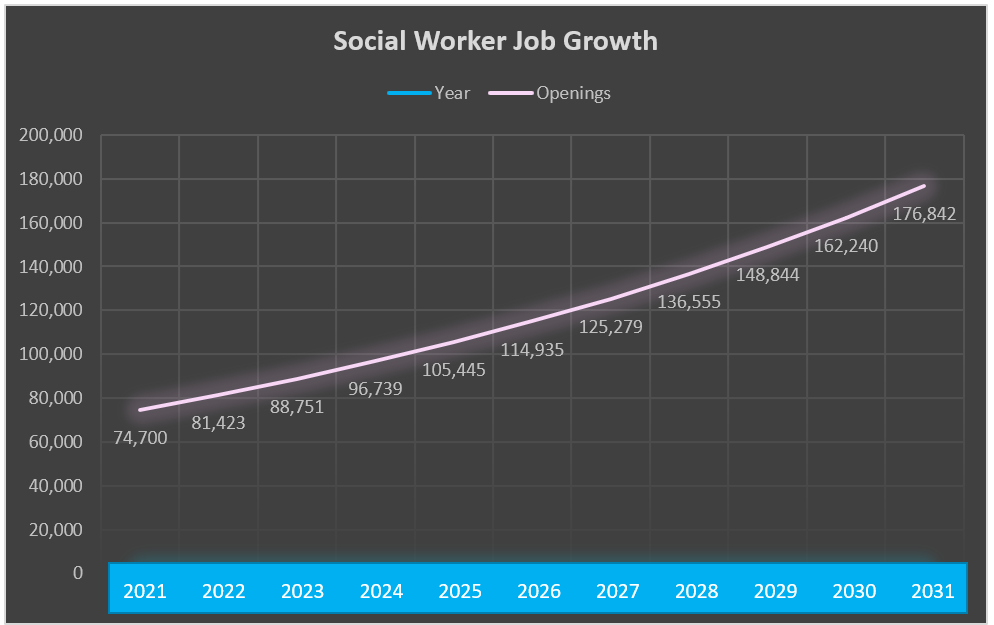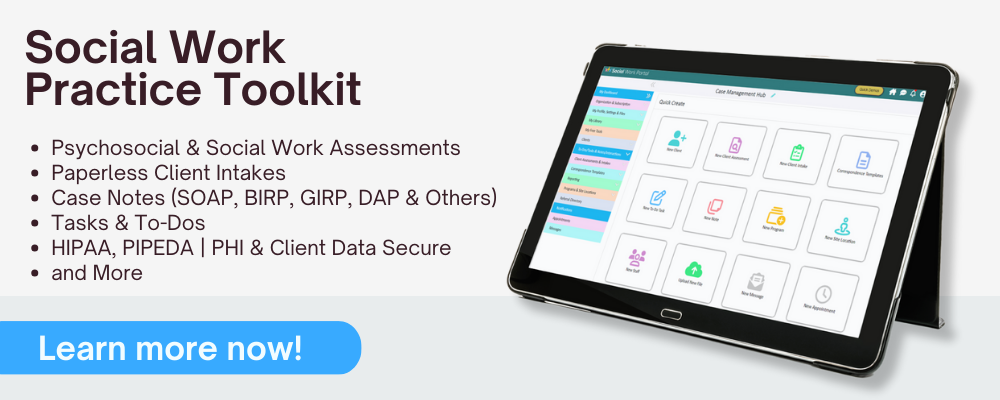Everything You Need to Know about Social Work Methods, Examples, and Role Types for Social Workers
What Are the Best Social Work? What Changed This Year? Learn about The Key Principles of Social Work Used Within Social Work Methods.
According to the US Labor Statistics Bureau (BLS), the field of social work is becoming the fastest growing career and is expected to grow by nine percent each year over the next decade.

In this article, we will provide answers to your questions about examples of social work and key principles you need to be aware of in order to increase your success. We’ll provide a best in class social worker overview to help you learn the social worker definition and the main principles of social work. We’ll also review social work assessment models, assessment tools, and outline different examples of social work case studies.
By the end of this guide, you should have a good understanding of the basics of a social work model and the social work definition as a whole.
This article is published for all Social Workers, including new and experienced professionals.

Example of Social Work | Principles of Social Work
The different social work models of assessment outlined in this page aim to guide an LMSW or other social work professional on how to counsel, treat, or otherwise care for someone that needs help.
Social work isn’t just limited to one sector. There are examples of social work in schools, hospitals, community groups, nursing homes, disaster relief, and even enterprise corporations. You might have even run across an example of social work in action and not realized that the helpful person providing assistance was a social worker.
Because there are many different types of social work, there are different assessment tools used to identify the needs of a client. The social work definition in one area of social work may also be slightly different than another.
But no matter what social work model or method is being used, at the heart of the profession is the desire to help people.

See Also: What is an Ecomap in Social Work Really Used for?
Table of Contents
Keep on scrolling down this page to read each section, or click any link below to go directly to that section.
- Social Work Definition
- What Really is an LMSW?
- What’s the True Difference Between LMSW & LCSW?
- Is There One Main Principle of Social Work or Several?
- Examples of Social Work & Different Types of Social Work
- What Are the Best Social Work Methods for Social Workers?
- What Are Social Work Models?
- Assessment Models in Social Work & Assessment Tools for Social Workers
- Conclusion | Social Work Examples & Assessment Models Social Work Practitioners Use
- LMSW Models of Assessment in Social Work FAQs

Don’t Miss: Social Work Psychosocial Assessment Guide with Examples
Contact us if you have any questions or feedback about this end-to-end social work genogram guide.
Social Work Definition
You’ll find various results when you search for the social work definition online. Some are short, while some are longer because they also try to include many different social work models and examples.
One short social work definition can be found on Google, supplied by Oxford Languages. It states that social work is “work carried out by trained personnel with the aim of alleviating the conditions of those in need of help or welfare.”
The International Federation of Social Workers (IFSW) has a more encompassing social work definition that is designed more for international community social work. It reads in part, “Social work is a practice-based profession and an academic discipline that promotes social change and development, social cohesion, and the empowerment and liberation of people.”
Social Worker Definition
A social worker definition would be closely related to the social work definition. A social worker is a trained professional that carries out social work for an organization.
The specifics of a social worker definition can change depending on the types of social work performed. One social work example might be a social worker supervising Foster Care parents. Another example of social work could be someone that counsels families in hospitals going through medical-related crises.
Related: Child Social Services & Social Work With Families – What You Need to Know
Interested in learning what an LMSW really means? Check out the section below.
What Really is an LMSW?
There are some acronyms that you’ll need to become familiar with when working with assessment models in social work. One of these is LMSW.
LMSW stands for Licensed Master Social Worker. Once you’ve earned a social work degree through on-campus or online MSW programs, you qualify to earn LMSW certification.
With LMSW certification you are considered a “licensed” social worker. This can qualify you for higher-level positions because you’ve illustrated your grasp of the principles of social work and different social work models.
Casework, policy planning, behavioral clinical work, and social advocacy are all different social work career paths that can be opened up when you become an LMSW.
Popular Article: Social Services Guide | All You Need to Know
See the section below for a comparison between LCSW and LMSW.
What’s the True Difference Between LMSW & LCSW?
Another certification beyond LMSW is LCSW (Licensed Clinical Social Worker). This license is more advanced than being a Licensed Master Social Worker and is usually taken as a next step after someone has obtained an LMSW.
With the LCSW credential, social workers can advance their careers into areas like working directly with clients in a therapeutic setting. The LMSW is not required as a prerequisite.
In addition to taking a licensing exam, to earn the LCSW certification, you need to have graduated from one of the CSWE-accredited on-campus or online MSW programs. It’s also required to complete between 3,000 and 4,000 hours of direct clinical work with at least one hour per week of clinical supervision.
Read More: Clinical, Medical & Hospital Social Worker Guide
Do you have any questions or feedback about this social work definition or social worker definition? If so, click here to contact us.
Is There One Main Principle of Social Work or Several?
There is no single main principle of social work, however, you will find several principles of social work throughout social work examples. These are guiding fundamentals that you’ll see used in all methods of social work.
According to the National Association of Social Workers (NASW), the core ethical principles of social work include the following:
- Social workers’ primary goal is to help people in need and to address social problems.
- Social workers challenge social injustice.
- Social workers respect the inherent dignity and worth of the person.
- Social workers recognize the central importance of human relationships.
- Social workers behave in a trustworthy manner.
- Social workers practice within their areas of competence and develop and enhance their professional expertise.
 |
eLearning Modules for New & Experienced Social Workers! Sign up for the All-in-One Case Management Hub and go to My Library! |
When looking for a principle of social work, you might also run across a list of seven basic principles of social work. These also connect to those we’ve listed above, and include:
- The Principle of Acceptance
- The Principle of Individualization
- The Principle of Communication
- The Principle of Determination
- The Principle of Confidentiality
- The Principle of Non-Judgmental Attitudes
- The Principle of Control Emotional Involvement

Related: Learn the Role of a Social Worker
Examples of Social Work & Different Types of Social Work
From forensic social work to gerontological social work, there is no lack of variety in the types of social work a person can choose for their career path.
Examples of social work can be found in several parts of government, communities, non-profits, and many other areas where social workers use assessment tools to identify needs and create a plan to help.
Are you tired of case management tools that are complicated and hard to use? Learn more about our easy and effective Case Management Software.
Here are a few of the many social work examples of the different types of positions a social worker can hold:
- Child & Family Social Work
- Healthcare Social Work
- Gerontological Social Work (work with the elderly)
- Home Health Social Work
- Forensic Social Work (applies social work to issues relating to law and legal systems)
- Mental Health Social Work
- Substance Abuse Social Work
- Psychiatric Social Work
- Corporate Social Work (assists employees in need and advises leadership on employee wellbeing programs)
- Community Social Work

Don’t Miss: What Are the Different Types of Social Workers
Contact us if you have any questions or feedback about this problem-solving model social work guide.
What Are the Best Social Work Methods for Social Workers?
Social work methods are used as a framework for social workers to provide care to a client.
What are social work methods as a whole? They’re a systematic process for providing assistance. For social workers to provide help to individuals, families, and communities, they need to apply a problem-solving model social work uses.
The type of problem that needs to be solved for the client will often dictate which framework to use from the different methods of social work. You can think of social work methods as different game plans that a team can follow to reach a goal most effectively.
With a social worker or LMSW, the model used will be chosen based on applying their experience and knowledge to the type of problem and client type being helped.
There are both primary and secondary methods of social work that professionals use.
The primary methods of social work include:
- Social Case Work Method: Focused on the individual relationship with one-on-one interactions with the client
- Social Group Work Method: Involves working in a group setting and leveraging the collective energy of the group to help all
- Community Organization Method: In this social work method, the goal is to meet community needs through the use of human and material resources
Here are examples of social work secondary methods:
- Social Welfare Administration Method: This involves developing programs and leveraging resources to transform social policy into social service
- Social Work Research Method: This method is connected to a problem-solving model social work uses to improve and become more effective
- Social Action Method: The goal is to bring about positive change in ineffective and broken systems by mobilizing resources and promoting awareness

The section below provides you with information about social work models. Contact us if you have any questions or feedback about this guide.
What Are Social Work Models?
When looking for the answer to, “What are social work methods,” you might also run across a social work model or two. Social work models are the approaches social workers can use to apply different social work theories of care.
When taking on-campus or online MSW programs, social work students learn many different social work assessment models and models for approaching care and intervention plans for clients.
You may be wondering if something like forensic social work is considered a social work model. This would be a “type” of social work that can be done, not a model.
An example of social work models would be the approach used to conduct forensic social work for a specific project. In other words, the method the social worker uses to interview, research, assess, develop a care plan, and implement assistance for a client.
|
Case Management Software – eLearning Resources – Assessment Templates Subscribe now! |
|
A principle of social work is to help people address problems they may be facing. Care plan and assessment models social work practitioners use give them step-by-step instructions on how to do that.
In this section, we’ll highlight social work models that are overall roadmaps of how to help people or groups. In the next section, we’ll go through some models of assessment in social work.
- Strengths & Solution-Focused Model: Focuses on identifying the individual’s strengths and support systems
- Narrative Model: Associates the problem with the relationship system rather than blaming the individual
- Task-Centered Model: Focused on developing skills in the client so they can use those to solve future problems
- Groupwork Model: Incorporates awareness of events at the individual level and group/relationships level
- Problem-Solving Model: In the problem-solving model social work professionals use, a problem is targeted and then an action plan is developed to solve it
- Cognitive-Behavioral Model: This model zeros in on the feelings and thoughts that influence behavior and how to identify those that cause self-destructive actions
- Crisis Intervention Model: This is used when the client is experiencing an acute or extreme trauma or situation

Popular Article: Social Work Risk Assessment Methods & Tools
Assessment Models in Social Work & Assessment Tools for Social Workers
Within each of the methods of social work and social work example models is the need to assess the individual, group, or community situation so appropriate assistance can be provided.
Models of assessment in social work can also be considered assessment tools. Different tools are needed to conduct a variety of different assessment types. Not all social work assessment models will require every one of the assessment tools.
The social work assessment tools used will depend upon the social worker’s definition of the client type and the reason for the engagement with that client.
Some of the common social work models of assessment are listed below. You can find more detail about these in our article, “Best Social Work Assessment – Guide, Samples, Template & All You Need to Know.”
Social work assessment models and assessment tools include:
- Needs assessment
- Strengths & opportunities assessment
- Mental/cognitive assessment
- Systems assessment
- Ecomap
- Genogram
- Culturagram
- Personal SWOT analysis
- Self-assessment survey
- GAD-7 assessment
- PHQ-9 assessment

See Also: Everything You Need to Know about Genograms in Social Work
Conclusion | Social Work Examples & Assessment Models Social Work Practitioners Use
When studying for your degree in online MSW programs and earning your LMSW or another social work certification, you will run across many examples of social work principles, methods, and models.
Each social work example, method, and model are important because they make up the toolbox of techniques that a social worker can pull from for any given client situation.
You may use one social work model exclusively today, but tomorrow, it might be necessary to apply other methods of social work to reach the goal of assisting a person or group. Thus, it’s important to have a working knowledge of many different types of social work models, methods, and assessment tools.

Don’t Miss: Social Work Clients & Questions Social Workers Ask
Are there any other principles of social work or methods or tools you use that you’d like to see included in this article to help other social workers? Just let us know!
LMSW Models of Assessment in Social Work FAQs
What is social work?
The social worker definition on Google is supplied by Oxford Languages. It states that social work is “work carried out by trained personnel with the aim of alleviating the conditions of those in need of help or welfare.”
What is an LMSW?
LMSW stands for Licensed Master Social Worker. Once you’ve earned a social work degree through on-campus or online MSW programs, you qualify to earn LMSW certification.
With LMSW certification you are considered a “licensed” social worker. This can qualify you for higher-level positions because you’ve illustrated your grasp of the principles of social work and different social work models.
Is there a main principle of social work?
There is no single main principle of social work, however, you will find several principles of social work throughout social work examples. These are guiding fundamentals that you’ll see used in all methods of social work.
According to the National Association of Social Workers (NASW), the core ethical principles of social work include the following:
1. Social workers’ primary goal is to help people in need and to address social problems.
2. Social workers challenge social injustice.
3. Social workers respect the inherent dignity and worth of the person.
4. Social workers recognize the central importance of human relationships.
5. Social workers behave in a trustworthy manner.
6. Social workers practice within their areas of competence and develop and enhance their professional expertise.
What assessment tools do a social worker and LMSW use?
The social work assessment tools used will depend upon the social worker definition of the client type and the reason for the engagement with that client.
Some of the common social work models of assessment include:
• Needs assessment
• Strengths & opportunities assessment
• Mental/cognitive assessment
• Systems assessment
• Ecomap
• Genogram
• Culturagram
• Personal SWOT analysis
• Self-assessment survey
• GAD-7 assessment
• PHQ-9 assessment
Note: Content on Social Works socialworkportal.com website is copyrighted.
Social Work Portal Disclaimer:
Social Work Portal is not a social work agency and we do not refer social workers. This web site is provided for educational and informational purposes only and does not constitute providing medical advice or professional services. The information provided should not be used for diagnosing or treating a health problem or disease, and those seeking personal medical advice should consult with ...
Read our full disclaimer here: Social Work Portal Disclaimer.
Image sources:
- Stock.adobe.com





